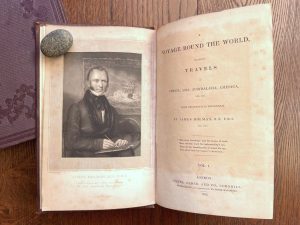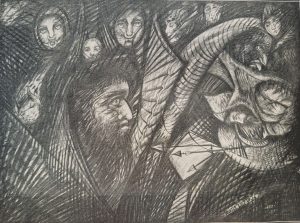Our Notes & References
Attractive, large format children book in Russian verses, produced in the émigré Russian community in Nabokov’s Berlin.
A scarce edition: of the 7 copies located in WorldCat, only two in the US (Princeton, University of Southern California).
This short story in verse at first seems to follow patterns of a typical colonial narrative but unusually takes a different path: the main character Petrushka decides to leave the planet Earth on a bunch of balloons because his fellow toys were laughing at his long nose. He lands on the moon and is greeted warmly by indigenous blue-skinned residents who watched his flight with admiration. The local king asks him to describe life on Earth, to which Petrushka tells about electricity and plumbing, but adds that he can no longer tolerate mockery of himself there. Impressed with his bravery, the king offers Petrushka to marry his daughter and to receive half of his kingdom. Overcoming a series of challenges, Petrushka then stays on the moon and eventually becomes its king.
The tale echoed the feelings of Georgii Rosimov (1894-1967) and most of his fellow citizens about their involuntary emigration and their desire for a better future in a new country. Remarkably, the attractive and colourful illustrations depict Petrushka in the same way as the moon dwellers who are dressed in similar clothes. Surrounded by exotic animals and plants, Petrushka performs the same actions as locals, to the point that it is sometimes difficult to visually distinguish him from them. The dreamlike, and in parts expressionist illustrations combine modernist perspective with linearity of mediaeval illuminations.
Rosimov’s tale was well received by his contemporaries. Roman Gul wrote in the Berlin journal ‘Novaia russkaia kniga’ [New Russian Book] (#1, 1923): “[Rosimov’s] children’s poems in their melodic qualities are not as simplistic as most of other works for children. They are full of rhythms, unexpected transitions, irregularities. But the inner complexity doesn’t feel artificial. It is organic, light, and will be easy to remember in children’s reading”.
The same year, and very likely around the same time, the book was printed in German as ‘Wurstel-Peters Mondreise: ein lustiges Märchen in Versen’ by Fritz Ostini (1861-1927), showing the same illustrations and naming the artist, the Austrian artist Alfred Zangerl (1892-1948). Zangerl’s name is not recorded in this Russian edition, yet his monogram still remains on the third plate. Curiously, both Russian and German bibliographies and library catalogues attribute the book to Georgii Rosimov (1894-1967) and Ostini respectively, without acknowledging the other author.
Ironically, a former participant of the White Movement, Rosimov wrote a series of books for children for Ivan Ladyzhnikov’s publishing house, which was originally sponsored by the Maksim Gorky to promote Marxist literature. Ladyzhnikov transferred his business to his partner Boris Rubinstein in 1912 and later worked in Soviet-backed magazines; the publishing house however kept his name for all its productions.
Bibliography
Primochkina N. N., “M. Gorkii i ‘Izdatelstvo I. P. Ladyzhnikova'” // Studia Litterarum, 2021. Т. 6, № 3. pp. 322–345.
R. G. [Roman Gul], [Retsenziia] // Novaia russkaia kniga, Berlin, 1923, №1. pp. 18-19.
Physical Description
Oblong folio (26 x 33 cm). [18] pp. incl. 8 full-page colour lithographic illustrations.
Binding
Original publisher’s cloth-backed pictorial boards.
Condition
Binding a bit rubbed and soiled, a little edge and corner wear; minor spotting and light browning, staples rusted and text-block now detached, but leaves in fresh condition.





















